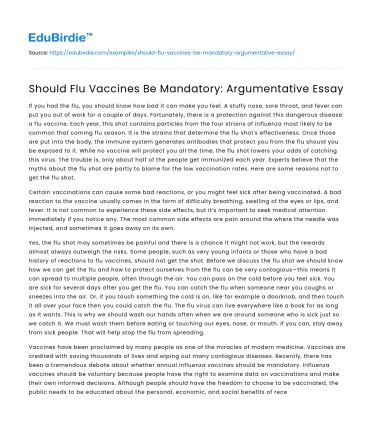If you had the flu, you should know how bad it can make you feel. A stuffy nose, sore throat, and fever can put you out of work for a couple of days. Fortunately, there is a protection against this dangerous disease: a flu vaccine. Each year, this shot contains particles from the four strains of influenza most likely to be common that coming flu season. It is the strains that determine the flu shot's effectiveness. Once those are put into the body, the immune system generates antibodies that protect you from the flu should you be exposed to it. While no vaccine will protect you all the time, the flu shot lowers your odds of catching this virus. The trouble is, only about half of the people get immunized each year. Experts believe that the myths about the flu shot are partly to blame for the low vaccination rates. Here are some reasons not to get the flu shot.
Certain vaccinations can cause some bad reactions, or you might feel sick after being vaccinated. A bad reaction to the vaccine usually comes in the form of difficulty breathing, swelling of the eyes or lips, and fever. It is not common to experience these side effects, but it’s important to seek medical attention immediately if you notice any. The most common side effects are pain around the where the needle was injected, and sometimes it goes away on its own.
Save your time!
We can take care of your essay
- Proper editing and formatting
- Free revision, title page, and bibliography
- Flexible prices and money-back guarantee
Yes, the flu shot may sometimes be painful and there is a chance it might not work, but the rewards almost always outweigh the risks. Some people, such as very young infants or those who have a bad history of reactions to flu vaccines, should not get the shot. Before we discuss the flu shot we should know how we can get the flu and how to protect ourselves from the flu can be very contagious—this means it can spread to multiple people, often through the air. You can pass on the cold before you feel sick. You are sick for several days after you get the flu. You can catch the flu when someone near you coughs or sneezes into the air. Or, if you touch something the cold is on, like for example a doorknob, and then touch it all over your face then you could catch the flu. The flu virus can live everywhere like a book for as long as it wants. This is why we should wash our hands often when we are around someone who is sick just so we catch it. We must wash them before eating or touching our eyes, nose, or mouth. If you can, stay away from sick people. That will help stop the flu from spreading.
Vaccines have been proclaimed by many people as one of the miracles of modern medicine. Vaccines are credited with saving thousands of lives and wiping out many contagious diseases. Recently, there has been a tremendous debate about whether annual influenza vaccines should be mandatory. Influenza vaccines should be voluntary because people have the right to examine data on vaccinations and make their own informed decisions. Although people should have the freedom to choose to be vaccinated, the public needs to be educated about the personal, economic, and social benefits of receiving the influenza vaccine.






 Stuck on your essay?
Stuck on your essay?

